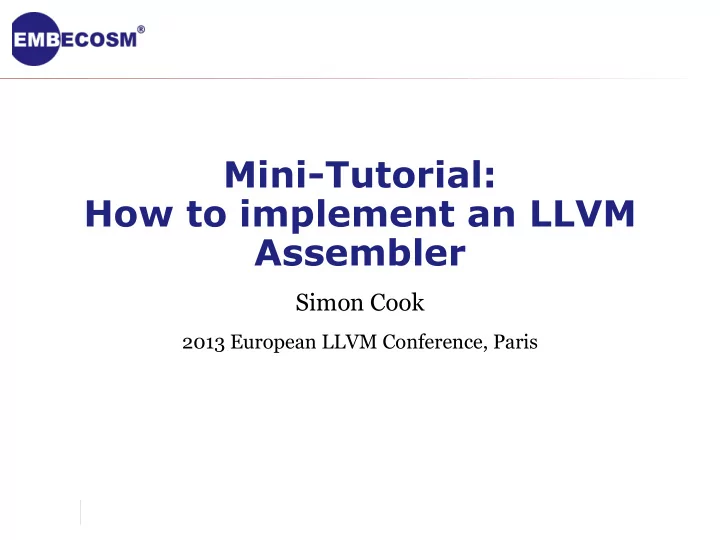

Mini-Tutorial: How to implement an LLVM Assembler Simon Cook 2013 European LLVM Conference, Paris
This presentation Inspired by previous tutorials. Covering some of the details easily tripped up on. Using the OpenRISC 1000 backend as an example where needed. More detailed version of this available in Embecosm Application Note 10: LLVM Integrated Assembler – http://www.embecosm.com/appnotes/ean10/ean10- howto-llvmas-1.0.pdf Source used as demonstration in GitHub: – https://github.com/simonpcook/llvm-or1k
Motivation for MC Based Assembler General (Simplified) Compiler Workflow. – clang – target=foo -c bar.c – Front End converts C to IR – Back End lowers IR to foo’s instruction set – Carefully format .s file – Assembler parses .s , generates object Key Idea: More efficient to directly generate the object file within the compiler. Additionally: We already defined our instruction set, why define it again?
4 Steps to Assembler Success 1. Parsing Instructions 2. Encoding Instructions 3. Decoding Instructions 4. Generating Object File (in our case ELF)
But First… Foo InstrInfo.td Instruction definitions need to link printable instruction to encoding. – field bits< n > Inst; – Inst field used with TableGen to get you 95% of the way by building instruction encoding/decoding tables. Set bits for instruction opcodes/etc. and fields filled in by backend.
Reduced or1k Example class InstOR1K<dag outs, dag ins, string asmstr, list<dag> pattern> : Instruction { field bits<32> Inst; bits<2> optype; bits<4> opcode; let Inst{31-30} = optype; let Inst{29-26} = opcode; } class InstRR<bits<4> op, dag outs, dag ins, string asmstr, list<dag> pattern> : InstOR1K<outs, ins, asmstr, pattern> { let optype = 0b11; let opcode = op; } class ALU_RR<bits<4> subOp, string asmstr, list<dag> pattern> : InstRR<0x8, (outs GPR:$rD), (ins GPR:$rA, GPR:$rB), !strconcat(asmstr, "\t$rD, $rA, $rB"), pattern> { bits<5> rD; bits<5> rA; bits<5> rB; let Inst{25-21} = rD; let Inst{20-16} = rA; let Inst{15-11} = rB; let Inst{9-8} = op2; let Inst{3-0} = op3; def ADD : ALU1_RR<0x0, "l.add", add>;
4 Steps to Assembler Success 1. Parsing Instructions 2. Encoding Instructions 3. Decoding Instructions 4. Generating Object File (in our case ELF)
Assembly Parsing Turns instruction strings into MC representations. Need to implement two classes: – Foo Operand – stores operand information and type e.g . “register”, “2” – Foo AsmParser – uses TableGen information to check validity, but need to write functions for parsing operands and creating Foo Operands . valid OpType ? create OpType : return 0; In ParseInstruction : If your instruction mnemonics are of the form l.add , the string needs parsing to form [l, .add] .
4 Steps to Assembler Success 1. Parsing Instructions 2. Encoding Instructions 3. Decoding Instructions 4. Generating Object File (in our case ELF)
Instruction Encoding To encode instructions, the class Foo MCCodeEmitter needs implementing providing the following functionality: – Target operand encodings getMachineOpValue for registers and immediates with no fixups. – Byte emitting (for current endianness) Emit in EncodeInstruction after calling TableGen getBinaryCodeForInstr . – Custom register function (in some cases)
Encoding Custom Operands Custom operands need encoding manually. Specify EncoderMethod in operand definition. Encoding is done within l.s. n bits, regardless of final dest. unsigned OR1KMCCodeEmitter:: getMemoryOpValue(const MCInst &MI, unsigned Op) const { unsigned encoding; const MCOperand op1 = MI.getOperand(1); assert(op1.isReg() && "First operand is not register."); encoding = (getOR1KRegisterNumbering(op1.getReg()) << 16); MCOperand op2 = MI.getOperand(2); assert(op2.isImm() && "Second operand is not immediate."); encoding |= (static_cast<short>(op2.getImm()) & 0xffff); return encoding; }
4 Steps to Assembler Success 1. Parsing Instructions 2. Encoding Instructions 3. Decoding Instructions 4. Generating Object File (in our case ELF)
Instruction Decoding Whilst not needed to assemble, generally also useful. To decode, implement foo Disassembler , centered around getInstruction . – General flow of function: 1. Read N bytes of memory. Call generated decode foo Instruction n . 2. 3. Return instruction. – In the case of variable length instructions, the approach is to loop the above, e.g. try 16-bit insns, then 32-bit. Operands are added with instructions addOperand function.
Decoding Tables with TableGen For disassembling to succeed, each possible encoding must map to only one instruction. Otherwise, build fails: Decoding Conflict: 010001.......................... ................................ JR 010001__________________________ RET 010001__________________________ Conflicts can be solved by providing context as to when to use each instruction. – Simplest (when useful) is to declare instructions as isPsuedo = 1 or isCodeGen = 1 .
4 Steps to Assembler Success 1. Parsing Instructions 2. Encoding Instructions 3. Decoding Instructions 4. Generating Object File (in our case ELF)
Writing ELF Objects To write ELF objects, foo ELFObjectWriter and foo AsmBackend need implementing. – AsmBackend responsible for applying fixups when information is available via applyFixup , adjustFixupValue and writeNopData . – ElfObjectWriter responsible for fixup to reloc conversion Other support definitions – Relocations in include/llvm/Support/ELF.h – Fixups in foo FixupKinds.h . createObjectWriter / createFooMCStreamer instantiates all of the above.
Done You should now be able to test your new assembler To test your assembler with clang – clang -target or1k -integrated-as helloworld.c
Thank you www.embecosm.com
Recommend
More recommend